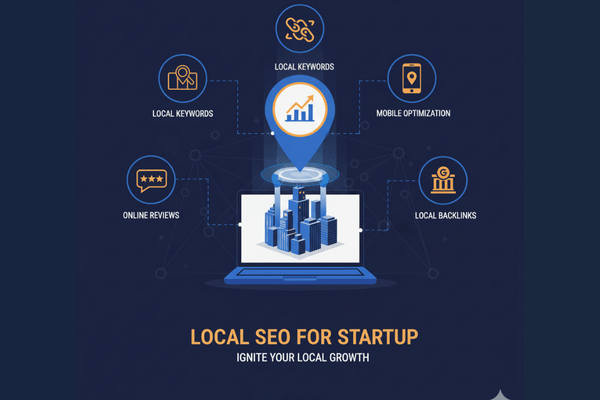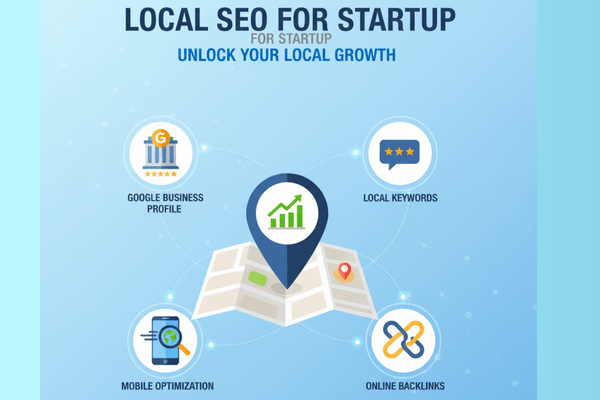Many hopeful startups feel overpowered by the larger companies that dominate their market, especially if they have a physical location or serve a particular region. But there’s one thing that can help you create leverage, level the playing field, and get your high-intent customers’ digital attention directed right to your door (virtual or otherwise): Local SEO for Startup. This means you’re not simply winning the battle with search presence, you’re getting the attention of people who are looking to shop for your product or service right now in their local neighborhood.
When you know how to successfully perform Local SEO for Startup, you will know the secret that takes prospective customers from searching online to having your brand in their hands. This guide will show you how to optimize Local SEO for Startup and get you moving at lightning speed.
Understanding Local SEO: Why It’s Crucial for Startups
For any startup that plans to provide its service locally, utilizing Local SEO for Startups is essential if your startup is a brick-and-mortar business, operates from home, or does local deliveries. Local SEO is about optimizing your online presence to rank organically in local search results. When someone searches for “coffee shop near me” or “plumber in [your city]”, you want to be the first name they see. You will bring good-intent customers, and it is important to help new startups grow fast with Local SEO because customers who are searching locally are ready to buy. The opportunity you have through Local SEO to reach your local market is immense.
Your Digital Front Door: Google Business Profile Optimization
Local SEO for a Startup can be greatly boosted through your Google Business Profile (GBP), previously known as Google My Business, which is probably the most important tool you have. It is your free digital storefront that showcases on Google Search and Maps. Without any compromise, you must make it happen in a very detailed manner.
- Claim and Verify: Make sure you own and verify your business listing.
- Complete All Fields: Every section should be filled out with great detail, business name, address, phone number (NAP), website, hours of operation, categories, services, and a catchy description.
- High-Quality Photos: Post pictures that attract people and are of your storefront, products, services, and team.
- Posts: Take advantage of the “Posts” feature to distribute updates, deals, and events. This makes your profile accessible and attractive.
- Q&A Section: Keep an eye on and respond to user questions. You can also be ahead of the curve by adding common questions.
It is a must-have for startups to have a localized search engine optimization so that GBP can be fully optimized.
N.A.P. Consistency: The Cornerstone of Local SEO for Startup
“N.A.P.” is an acronym for Name, Address, and Phone Number. Local SEO is very essential for a Startup, and in order to achieve it, you need your name, address, and phone number (also called NAP) to be the same not only offline but also online. Firstly, it is necessary to verify the business information. Secondly, the reason is that Google is always searching the web for content about businesses and their details. If Google comes across discrepancies (two different phone numbers, slightly different addresses), it confuses and reduces the trust level of Google which may lead to your local rankings getting lower.
Make sure that your name, address, and phone number are exactly the same when listing your business on:
- Google Business Profile
- Website
- Social media profiles (Facebook, Instagram, LinkedIn, etc.)
- Online directories (Yelp, Yellow Pages, industry-specific sites)
- Review sites
This level of detail is a small but important factor in Local SEO for Startup.

Local Keyword Research: Finding Your Neighborhood’s Needs
Like SEO, Local SEO for Startup is all about understanding what your target customers are searching for. The only thing that is different is the local intent. Part of your keyword research should involve location-based keywords.
- “Near Me” Keyword Searches: Customers often search for the term “pizza near me” or “doctor near me”.
- City/Neighborhood Names: Use phrases that almost always include your city, or if your business is in a neighborhood, use the name of the neighborhood, or if near a landmark, such as “graphic designer Austin” or “bakery in Brooklyn Heights”.
- Service + Location: Use your service along with your target city or cities, such as “mobile car wash [ city name]”.
Relevant local keywords can be identified by using various tools like Google Keyword Planner, Google’s “People also ask” section, and by looking at the keywords that competitors are ranking for. It is crucial to integrate these keywords along with their variations in a wholesome and organic manner to accomplish the desired effect of Local SEO for Startups.
On-Page Optimization for Local Relevance
Your company’s website requires a local SEO optimization algorithm to indicate local relevance to crawlers or local search engines, and with Local SEO for Startup, you want to effectively use your chosen local keywords in a natural, intentional fashion for your website content.
- Service Pages – You can optimize for your website by creating a page for each service you have, with the geographic area of service included.
- Location Pages – If you are a physical business and have multiple locations, be sure you have pages for each geo-specific location with their own copy about the location, directions, and testimonials.
- Header Tags (H1, H2, H3) – Use local keywords and phrases throughout your heading tags to break up your content.
- Meta Title & Description – Be sure to use the city/region and primary keywords in the meta title and description tags of every page (relevant page, of course).
- Local Content – Create a blog post on community resources, area events, or news, or how your services create a meaningful benefit to residents.
These simple changes to your website will add even more impact to your Local SEO for Startup.
Local Link Building: Earning Trust in Your Community
Backlinks are an important component of rankings for local searches, but as the local SEO approach for a startup develops, the must-have backlinks emphasize links from other reputable sites that are locally relevant. These links to your site tell Google that your organization is a trusted member of the local community.
- Local Partnerships: Work with other local businesses to do joint promotions, or cross-promote each other on each other’s domains.
- Sponsorship: Be a sponsor of local events, recreational sports teams, or community initiatives. Most times, with a sponsorship, you’ll receive a link on their website.
- Chamber of commerce/local business associations: Become a member of a local chamber of commerce or local business association and take advantage of their online directory and networking opportunities.
- Local Media: Get featured with local media (i.e., news outlets/news/etc, blogs, or online magazines).
Developing these community partnerships is not just good for PR; it’s a very effective local SEO for a startup strategy.
Harnessing Online Reviews: Your Social Proof for Local SEO for Startup
Online reviews are powerful influencers on search engines and customer decisions. Positive online reviews on Google Business Profile, Yelp, Facebook, and industry-specific sites will boost your credibility and send strong trust signals to Google.
- Request Reviews: Proactively ask satisfied customers for reviews (follow up with an email, provide a QR code in your store, etc. )
- Respond to All Reviews: Acknowledge customers who leave you positive reviews, and be polite when addressing negative reviews. Thank them for their feedback, and let them know you take the customer experience seriously. You can even turn a negative experience into a positive one.
- Manage Your Reputation: All reviews are important, so checking sites for reviews regularly will help you manage your business.
A strong review profile is a crucial element of effective Local SEO for Startup.
Local Citations: Building Authority Beyond Google
Citations (a mention of your business NAP (Name, Address, Phone Number) on the web, even if it is not linked) make it possible for search engines to confirm your business data and create trust.
- Directories: Get your business listed on the most popular online directories such as Yelp, Yellow Pages, Foursquare and other industry-specific aggregators.
- Social Media: Make sure your NAP is the same on all your social profiles.
- Local Blogs/Forums: Get some exposure in local content where your target customers read.
The more correct and consistent your citations, the stronger your Local SEO for Startup base.
Mobile Optimization: Reaching Customers on the Go
Most local searches are on the go i.e., mobile, thus if your website is not optimized for mobile, you are losing a big chunk of local customers and your Local SEO for Startup will be limited.
- Responsive Design: Your website should be such that it can fit any screen size without the need for manual adjustment.
- Fast Loading Speed: Users of mobile devices expect to be served quickly. Hence, you have to optimize both images and code if you want your site to be quick.
- Click-to-Call Buttons: MOBILE users should be allowed to call your business without any delay via your website.
- Clear Navigation: Easy, user-friendly navigation is the core of the mobile user’s needs.
The flawless mobile getaway is the number one priority for efficient Local SEO for Startup.
Advanced Strategies for Local SEO for Startup Growth
Once you’ve nailed the basics, consider these advanced tactics to further boost your Local SEO for Startup:
- Schema Markup: Implement local business schema on your website to provide search engines with structured data about your business, to assist search engines in understanding your content better.
- Geo-targeted Ads: Leveraged localized Google Ads campaigns to supplement your organic efforts, especially during important dynamic times.
- Video Marketing: Localized videos of your business, your service or community involvement can be a viable way of promoting your local business.
- Google Local Service Ads: These are paid ads, which will show at the very top of the Google search results for certain service-based businesses and may produce leads that are of a higher quality and more likely to become your business.
By systematically implementing these Local SEO for Startup strategies, your startup won’t just survive; it will thrive and become a dominant force in its local market.
Conclusion
Embracing Local SEO for Startup isn’t just a marketing tactic; it’s a fundamental strategy for new businesses aiming for tangible, localized growth. By meticulously optimizing your Google Business Profile, ensuring NAP consistency, targeting local keywords, and actively managing reviews, you’re building a robust digital foundation. This strategic focus ensures that when local customers search for solutions, your startup is not just visible but the preferred choice. Master these Local SEO for Startup essentials, and watch your business transform from a local contender into a recognized and trusted community pillar, driving sustainable growth right where it matters most.
Frequently Asked Questions (FAQs)
Q. Is Local SEO still important with so many people shopping online?
Ans: Yes, absolutely. Even with the rise of e-commerce, a huge number of online searches have local intent. People use their phones to find nearby restaurants, stores, and services. For any business that serves a specific geographic area, Local SEO for Startup is critical for getting found by customers who are ready to buy.
Q. How long does it take to see results from Local SEO?
Ans: You can often see results from Local SEO for Startup much faster than traditional SEO. By optimizing your Google Business Profile and local citations, you might see improvements in your rankings within a few weeks to a couple of months. However, building a strong local presence takes consistent effort over time.
Q. Do I need a physical storefront to do Local SEO?
Ans: No, you don’t. While a physical location is great, you can still use Local SEO for Startup if you’re a service-based business that travels to customers (like a plumber or landscaper). Google Business Profile has an option for “Service-area businesses” that lets you list the areas you serve without showing a public address.
Q. What’s the difference between Local SEO and regular SEO?
Ans: Regular SEO focuses on ranking nationally or globally for broad keywords. Local SEO for Startup, on the other hand, is all about ranking in a specific geographic area. It involves unique strategies like optimizing your Google Business Profile, managing local citations, and getting reviews from local customers.
Q. How important are online reviews for my business?
Ans: Online reviews are incredibly important. For Local SEO for Startup, reviews on Google Business Profile, Yelp, and other sites are a major ranking factor. They also build social proof and trust with potential customers. Always ask satisfied customers for reviews and respond to every one, both positive and negative, to show you’re engaged.

